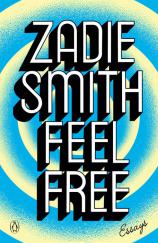Feel Free: Essays
Review
Feel Free: Essays
It hardly seems possible that it’s been nearly two decades since Zadie Smith exploded onto the literary scene with her novel, WHITE TEETH. Since then she’s published four more novels, but, like the late John Updike, she’s had a busy side gig producing criticism and other nonfiction pieces for magazines that include the New York Review of Books, the New Yorker and Harper’s.
Now, alongside 2010’s CHANGING MY MIND, Smith has delivered another ample and deeply engaging volume of these writings. Like its predecessor, FEEL FREE is an impressive collection that ranges around the world, considering topics as diverse as post-Brexit Great Britain, the sketch comedy of Key and Peele, and her inexplicable discovery of a fondness for the music of Joni Mitchell.
In FEEL FREE’s foreword, Smith confesses to a certain “anxiety” [that] comes from knowing I have no real qualifications to write as I do.” Despite the breadth of these pieces and the depth of her intelligence, Smith is nothing if not self-deprecating, pegging her “sole area of expertise” as “reading novels.” And in an essay on the 18th-century German painting, Alte Frau, she dismisses herself as no more than a “casual appreciator” of art. What’s revealed here, to the contrary, is that Smith is a sharp and passionate critic about any subject that engages her curiosity.
"[T]aken as a whole, it’s impossible to come away from this volume not feeling smarter simply for the fact of having spent time in Zadie Smith’s stimulating company."
And that’s what allows her to traverse such a wide universe of topics. In the Joni Mitchell piece, she describes her transformation from finding the pop singer’s work “incomprehensible” to suddenly experiencing it as “an emotional overcoming, disconcertingly distant from happiness, more like joy --- if joy is the recognition of intolerable beauty.” The essay doesn't confine itself to music appreciation, visiting the work of Wordsworth, Seneca, Kierkegaard and the biblical story of Abraham's binding of Isaac along the way.
But Smith doesn't live only in the world of art. She self-identifies as “by nature not a political person,” and although the overtly political pieces here are limited to a handful in the volume’s opening pages, they cover provocative ground.
In “On Optimism and Despair,” a talk she delivered in Berlin in November 2016, commenting on the fragility of progress in the decade leading up to the Brexit vote and the election of Donald Trump, she calls these “the darkest political times I have ever known.” Comparing humans to “complex musical scores from which certain melodies can be teased out and others ignored or suppressed, depending, at least in part, on who is doing the conducting,” she observes that the “conductors” like Trump or Nigel Farage aligned with troubling nationalist movements “have only the most banal melodies in mind.” And yet, she says, concluding on an optimistic note, “Those of us who remember, too, a finer music must try now to play it, and encourage others, if we can, to sing along.”
At the same time, Smith isn’t afraid to induce discomfort on her own side of the political spectrum. In “Fences: A Brexit Diary,” she chides her fellow Britons who derided the “Leave” bloc in the June 2016 referendum for the fact that their pride in their “multicultural, outward-looking city” is, to be generous, more than little unjustified.
Coming from Smith, born in London as the child of a white English father and a black mother, native to Jamaica, that preoccupation with multiculturalism and identity is unsurprising. It surfaces, for example, in “Brother from Another Mother,” an extended New Yorker profile on the biracial comedians Keegan-Michael Key and Jordan Peele, and how they address the “communality of race, about which we are rarely allowed to laugh.” Smith returns to Peele and the issue of racial identity in “Getting In and Out,” a review of his groundbreaking 2017 film, Get Out, one she calls “neither a horror nor a fantasy. It is a fact of our experience.”
“I have a very messy and chaotic mind,” Smith confessed in a recent feature in the Guardian, “but when I’m writing an essay I find I can exert a bit more control over it.” Once again, she's too modest. Every one of these essays is tightly constructed and displays her gift for opening out from an acute observation to a broad subject, as when a walking trip through her mother's London neighborhood in “Northwest London Blues” expands into a consideration of the conflict between private interests and public goods. To similar effect is “Man Versus Corpse,” a reflection on death, featuring commentary on Andy Warhol and Karl Ove Knausgaard inspired by an early 16th-century Italian charcoal drawing in a book she picked up one rainy evening in the lobby of her New York apartment building.
As in any such collection, not every subject or its treatment will appeal equally to every reader. But taken as a whole, it’s impossible to come away from this volume not feeling smarter simply for the fact of having spent time in Zadie Smith’s stimulating company.
Reviewed by Harvey Freedenberg on February 16, 2018
Feel Free: Essays
- Publication Date: February 5, 2019
- Genres: Essays, Nonfiction
- Paperback: 480 pages
- Publisher: Penguin Books
- ISBN-10: 014311025X
- ISBN-13: 9780143110255




